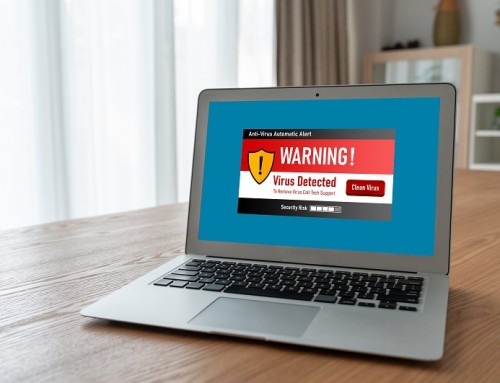It’s increasingly common for people to spend large portions of their day online, for everything from business to social media to online banking and bill pay. The more our lives become digitized, the more motivation there is for criminals to focus on our online presence. It’s easy to become complacent and fall into habits that can open your life up to hackers and scammers. Here are 5 of the most common and risky habits that we see.
- Opening email links or attachments from strangers
This is first on our list because it’s the one we see cause the most problems. Any time someone sends you a link or an attachment, there’s a few things you should ask yourself: Do I know this person? Was I expecting a document or link from them? Is this person actually who they are claiming to be?
Make sure the email address the email was sent from matches the email address for that contact. Pay attention to the grammar and tone of the email – does it match what you’d expect from this contact? Is the document or link they sent something you would expect to receive? Finally, if you’re ever really unsure, reach out to that person another way besides email, e.g. a phone call, to verify that the email was really from that person.
- Conducting sensitive business over public Wi-Fi
While coffee shops and similar businesses often provide free wireless internet access these days, it’s worth noting that these networks are very easy to hack and monitor by malicious third parties. When using a public wireless network, never conduct any financial business (banking, bill pay, online shopping), do not log into social media (that is, do not enter your password for anything), and don’t check sensitive email.
If you need to rely on these public networks to conduct business, utilize a VPN (virtual private network) service to secure the transfer of your information.
- Password mismanagement
It’s very common for people to use the same password across multiple services. This can be a recipe for disaster, because if one of those accounts is compromised, the rest can fall quickly behind it. Using the same password for personal accounts and business accounts is another poor practice that can cost your company greatly.
Lastly, using a weak or easily guessed password is all too common. Make sure your password is sufficiently long, has a variety of letters, numbers, and special characters, and does not contain your name or any other easily guessed words or phrases.
- Leaving your PC unattended
When working on your PC, whether it’s at work or a laptop in public, it’s important to lock your PC when stepping away, even for a brief moment. We frequently see screens left unlocked with sensitive information displayed or readily available. It takes just a second to lock a PC (on Windows, CTRL ALT DEL then “Lock,” or just Windows-key + L), and doing so will prevent prying eyes from seeing your confidential data.
- Using USB devices from unknown sources
People will often come into possession of USB drives that they did not purchase, often as a marketing item from other businesses or conferences. It’s important to be wary of USB drives that you did not obtain directly from a retailer or manufacturer, as they can be easily infected. An infected USB drive can deploy malware on your PC, such as a keylogger that sends what it captures to a remote server, thereby compromising your passwords, credit cards, etc. This is just an example; there are many varieties of malicious USB drives. Often, they will operate silently, providing no obvious evidence that they are malicious.
The fact is, if you need a USB drive for portable storage, just buy one (or ask your company to buy one for you). They are inexpensive, and the risk of using one from an unknown source is just not worth it.
While we could break down many more online “sins” that get people into trouble, these seem to be the most common causes of stolen information, malware, phishing scams, etc. None of these risky behaviors are difficult to correct – they all just require a little bit of common sense and healthy skepticism toward the cyberspace we so frequently occupy today. For more information on how to secure your systems and network, Contact Us today.







